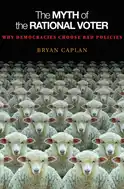
The Myth of the Rational Voter - by Bryan Caplan
ISBN: 9780691138732Date read: 2025-07-03
How strongly I recommend it: 7/10
(See my list of 430+ books, for more.)
Go to the Amazon page for details and reviews.
A critical look at democracy. I love the way he thinks so it’s fun to hear his thought process even though I’m not that interested in this subject.
my notes
Democracy fails because it does what voters want, instead of what they need.
For example: The median voter would be better off if he received less protection than he asked for.
But competition impels politicians to heed what voters ask for, not what is best for them.
Faith means not wanting to know what is true.
Demagoguery is the natural condition of democracy.
Demagoguery is the winning strategy as long as the electorate is prejudiced and credulous.
The public has severe doubts about how much it can count on profit-seeking business to produce socially beneficial outcomes.
They focus on the motives of business, and neglect the discipline imposed by competition.
Profits give incentives to reduce production costs, move resources from less-valued to more-valued industries, and dream up new products.
This is the central lesson of The Wealth of Nations: the “invisible hand” quietly persuades selfish businessmen to serve the public good.
Business profit appears to be a transfer but benefits society.
Business philanthropy appears to benefit society but is at best a transfer.
If you put the question directly, “Is higher productivity better than lower productivity?,” few people will answer in the negative.
Yet policy changes are often sold as ways to “create jobs.”
But we can also create jobs by seeing to it that each worker is less productive.
Then more labor will be required to produce the same bill of goods.
For an individual to prosper, he only needs to have a job.
But society can only prosper if individuals do a job well.
To progress is to increase the ratio of effort to result.
In 1800, it took nearly 95 of every 100 Americans to feed the country.
In 1900, it took 40.
Today, it takes just 3.
People would rather feel compassionately than think logically.
You do not worry about how to spend the hours you save when you buy a washing machine.
Blaming the present, and admiring the past, is strongly rooted in human nature.
Pessimistic bias to account for superstition: “Where real terrors are wanting, the soul finds imaginary ones.”
There swells louder and louder the cry that the evils are so great that nothing short of a social revolution can cure them.
It is a rare person who seriously considers, “Maybe others disagree with me because they know more than me.”
It is irrational to be politically well-informed because the low returns from data simply do not justify their cost in time.
Because the expected personal benefit of voting is roughly zero, a rational, selfish individual chooses to be ignorant.
Suppose a robber has a 50% chance of being caught lifting $1,000 from a cash register.
If the punishment is a $1,000 fine, crime pays: Heads, the thief wins; tails, he breaks even.
Legal systems cope with this problem by making a convicted criminal much worse off than he would have been if he had obeyed the law.
In economic jargon, the law imposes “probability multipliers” — making sentences tougher as the chance of being caught declines.
An ignorant electorate can use the same strategy to control politicians.
Voters do not need to pay much attention to politics; they only need to vow revenge if they catch their leaders misbehaving.
You learn that a congressman uses the franking privilege to send personal mail — give him a year of jail.
A cabinet member mutters a racial epithet on tape — demand his resignation.
But a democratically elected leader (currently) can break all his campaign promises without risking a day in jail or a one-dollar lawsuit.
Heads he wins, tails he breaks even: a recipe for constant abuse.